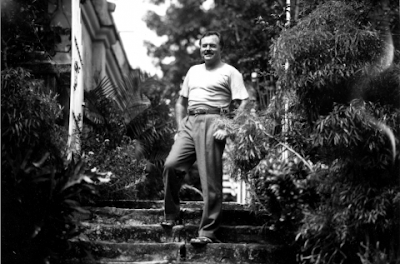 |
| Pioneer Courage Park, Omaha Nebraska |
Amy Athey
McDonald has published an article in Yale News titled: On
gunfights, U.S. colonialism, and studying the American West on the East Coast.
The article includes an interview with John Mack Faragher, the
Howard R. Lamar Professor of History and American Studies, and director of the Howard R. Lamar Center for the Study of
Frontiers and Borders.
The Lamar Center site has a nifty feature which
displays a different student’s dissertation blurb every time you refresh the
screen. (You can actually catch gems like this: “I seek to foreground these
events as a historical pivot point during which North American and global
geopolitics, British-American relations, and both “American” and “Canadian”
native peoples’ status and territorial control hinged on seemingly peripheral
people, movements, and landscapes.”)
It’s nice to see the American frontier get some
attention, but I’m not an enthusiast for the tone of the article or the Howard
R. Lamar Center. If you don’t want to take the time to read the article or
visit the site, I can summarize the content of both in a few words—pioneers wore
black hats.
Professor
Faragher said in the interview, “As I insist with my students, for every
community founded in the American West, imagine that one was destroyed, and
people killed, removed, or pushed aside.”
 |
| Pioneer Courage Park, Omaha Nebraska |
He lost me
right there. When I read that sentence I heard Professor Faragher say he wanted
no uplifting messages about the frontier spirit. If his students
persisted, then he insisted that they balance their dissertation by showing how pioneers
despoiled all that was good and decent in the Americas.
He says, “The best side of our history is the attempt to form a just society out of our
less than promising beginnings.” In other words, we started poorly, but if we learn
from our disreputable past we can fix our society so it is just.
We started better than any other nation in history.
How many civilizations had a chance to start fresh and declared with their first
free breath that, “We hold these truths to be self-evident, that all men are
created equal, that they are endowed by their Creator with certain unalienable
Rights, that among these are Life, Liberty and the pursuit of Happiness.”
Granted, the words were aspirational—still are—but what other collection of
people defined such a precise and idealistic goal for themselves. Just because
we struggle to act in accordance with this lofty goal is no reason to vilify
ourselves.
 |
| Pioneer Courage Park, Omaha Nebraska |
I believe all people are the same. The same virtues,
the same flaws. I came to this conclusion early in life from reading the Bible.
It occurred to me that human frailties have not changed in thousands of years. Races
and countries and clans are not noble. Collections of people cannot be consistently honorable. Individuals, however, can be noble, but more likely they perform
noble acts in what might otherwise be an ignoble life.
There is no excuse for appalling acts by politicians,
soldiers, and settlers. But to emphasize the negative over the courageous and
honorable actions of most pioneers is not the path to a just society. We must look honestly at our past, but also see the
brave and stalwart souls who struggled to make this a better world.
Man cannot be made perfect, but he can be inspired to
lean toward his better nature.







